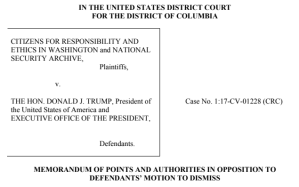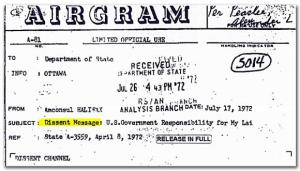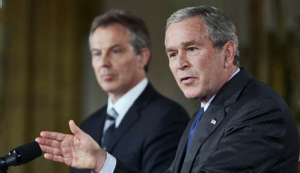Disappearing Messaging Apps Are Subject of Ethics Training Thanks to PRA Suit: FRINFORMSUM 3/22/2018
 Presidential Records Act Case Draws Attention to White House’s Disappearing Messaging Apps
Presidential Records Act Case Draws Attention to White House’s Disappearing Messaging Apps
The U.S. District Court for the District of Columbia’s Judge Christopher Cooper ruled against Citizens for Responsibility and Ethics in Washington (CREW) and the National Security Archive in our Presidential Records Act lawsuit targeting the Trump administration’s use of disappearing messaging apps. The suit was filed in June 2017 on the heels of reports that some members of the White House staff were using messaging apps, like Confide, that prevent the storage and preservation of records.
Cooper said the plaintiffs were “likely right on the merits, but that he was nevertheless constrained to grant a government request to dismiss the suit on procedural grounds” – in part because Congress made no provision for private groups to seek the enforcement of the PRA.
The Washington Post reported during the course of our suit that “White House lawyers have been reminding President Trump’s staff not to use encrypted messaging apps for official government business” because doing so could run afoul of the PRA — in and of itself a positive outcome from the Archive’s litigation.
The Archive and CREW are currently considering our options going forward.
 Is the Dissent Channel Safe from Retaliation Under Trump Administration?
Is the Dissent Channel Safe from Retaliation Under Trump Administration?
Talking Points Memo reports that two State Department officials responsible for “sidelining a civil servant suspected of disloyalty to the President” are also in charge of the Department’s Dissent Channel. The news is troubling because the position likely gives the overseeing officials access to the names of those who voice opposition to official policy and could reasonably deter or intimidate those who want to dissent. TPM’s report has prompted calls from Democrats on the House Oversight Committee to ensure that the dissent channel is overseen by non-partisan actors.
The news comes on the heels of the National Security Archive’s FOIA lawsuit victory securing the release of dissent channel cables dating from the early 1970s through the early 1990s. The declassified cables show, among other things, Foreign Service Officers protesting US inaction over My Lai atrocities, US “policy of non-intervention in Burundi during massive murdering of Hutu tribesmen”, and US recognition of Guatemalan dictator General Efrain Rios Montt.
In the words of Ambassador and dissenter Thomas Boyatt, “In the US federal government (and probably the world) [the institutionalization of dissent] exists in only one place – the US Department of State. For more than 40 years, whistleblowers and those prepared to tell truth to power have been protected and respected there.”
Government Study Saying Booze is Good for You Funded by Alcohol Industry
Records won through FOIA helped inform a New York Times investigation showing, contrary to official statements, that National Institute of Health officials sought substantial industry fundraising for a study on alcohol. Specifically, the Institute on Alcohol Abuse and Alcoholism, one of NIH’s 27 centers, vigorously courted the alcohol industry to fund a 10-year $100 million study by saying that it “might well deliver all the medical evidence needed to recommend a daily alcoholic drink as part of a healthy lifestyle.”
NIH announced after the Times story broke that it is investigating whether officials violated agency policy when soliciting industry funding for the study.
FOIA Shows Zinke’s Security Detail on Personal Vacation
FOIA-released records are raising more questions about Department of the Interior Secretary Ryan Zinke’s travel expenses and mixing of personal and official business. The records show that the secretary and his wife brought a security detail on an international vacation to Turkey and Greece, a trip on which he conducted no government business. Politico reports that “Only two agencies — the State Department and the Secret Service — have specific authority allowing them to provide security to executive branch officials” and that there should be a compelling national security threat for bringing a security detail on a personal vacation.
The Interior Department’s Inspector General will also release a report next month on the Secretary’s attendance of political functions while on official business next month.
CRS Reports to Be Available To The Public
Senator Patrick Leahy (D-VT) secured a big transparency win for open government in the Omnibus Appropriations Bill released Wednesday night. Senator Leahy successfully included a provision in the bill that makes “all non-confidential reports prepared by the Congressional Research Service (CRS) freely available to public schools and libraries across the country. That means they will be freely available online to individuals, schools and universities, researchers, and libraries.”
This is a significant victory that members of Congress, including Senators Leahy and John McCain, as well as open government advocates like Daniel Schuman at Demand Progress, have been working on for more than 15 years. Congrats to all!
The Nuclear Nonproliferation Treaty and the German Nuclear Question: Part II, 1965-1969
Declassified documents recently published for the first time by the National Security Archive and the Nuclear Proliferation International History Project show that the Nuclear Non-Proliferation Treaty (NPT), widely accepted today as a global standard for international nuclear policy, was actually a source of significant tension between the United States and West Germany in the mid-1960s.
The posting marks the 50th anniversary of the NPT’s approval by the United Nations General Assembly and concludes a two-part series on U.S.-West German interactions on nonproliferation from the late 1950s to 1969.
Part 1, Preoccupations with West Germany’s Nuclear Weapons Potential Shaped Kennedy-Era Diplomacy, can be read here.
NATO Expansion: What Yeltsin Heard
Declassified documents from U.S. and Russian archives show that US officials led Russian President Boris Yeltsin to believe in 1993 that the Partnership for Peace was the alternative to NATO expansion, rather than a precursor to it, while simultaneously planning for expansion after Yeltsin’s re-election bid in 1996 and telling the Russians repeatedly that the future European security system would include, not exclude, Russia.
The declassified US account of one key conversation on October 22, 1993, shows Secretary of State Warren Christopher assuring Yeltsin in Moscow that the Partnership for Peace was about including Russia together with all European countries, not creating a new membership list of just some European countries for NATO; and Yeltsin responding, “this is genius!”
A year later, Yeltsin would accuse the U.S. of replacing the Cold War with a “cold peace” by planning to expand NATO; and the Americans tried to repair relations by insisting that expansion would happen, but slowly, “no surprises,” and only after the Russian parliamentary elections of 1995 and the Russian and U.S. presidential elections of 1996.
 TBT pick – U.S. Military Hoped for Virtually Unlimited Freedom of Action in Iraq
TBT pick – U.S. Military Hoped for Virtually Unlimited Freedom of Action in Iraq
This week’s #TBT pick is chosen with the 15th anniversary of the US invasion of Iraq in mind. This week’s #TBT pick is a 2010 posting from the Archive’s Iraq Project on the lead-up to the Iraq war, specifically focusing on declassified US and British documents that gave no indication alternatives to invasion were seriously considered – contrary to statements made by both President Bush and Prime Minister Blair at the time.
Sign Up
Want to stay on top of the latest FOIA news? Click here to sign up for our weekly FRINFORMSUM (Freedom of Information Summary) email newsletter.

Comments are closed.